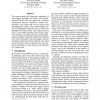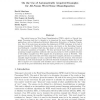21 search results - page 3 / 5 » Knowledge-Rich Word Sense Disambiguation Rivaling Supervised... |
ACL
2010
13 years 5 months ago
2010
In spite of decades of research on word sense disambiguation (WSD), all-words general purpose WSD has remained a distant goal. Many supervised WSD systems have been built, but the...
COLING
2002
13 years 7 months ago
2002
In this paper, a supervised learning system of word sense disambiguation is presented. It is based on conditional maximum entropy models. This system acquires the linguistic knowl...
EMNLP
2004
13 years 9 months ago
2004
This paper explores the large-scale acquisition of sense-tagged examples for Word Sense Disambiguation (WSD). We have applied the "WordNet monosemous relatives" method t...
ICTAI
2009
IEEE
14 years 2 months ago
2009
IEEE
Knowledge plays a central role in intelligent systems. Manual knowledge acquisition is very inefficient and expensive. In this paper, we present (1) an automatic method to acquire...
JAIR
2008
13 years 7 months ago
2008
This article focuses on Word Sense Disambiguation (WSD), which is a Natural Language Processing task that is thought to be important for many Language Technology applications, suc...


